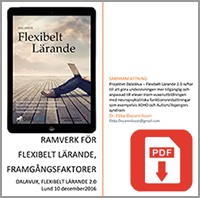 Excerpts from the report: Framework for flexible learning, in December 2016, researcher Ebba Ossiannilsson.
Excerpts from the report: Framework for flexible learning, in December 2016, researcher Ebba Ossiannilsson.
Guide – research on the challenges and success factors for learning in digital environments
In the report above, some commonly used international educational frameworks and quality models have been described. It has been described that there are many definitions of quality and there are many who are interested in quality. However, it is often said that there is actually only a definition and that is that quality lies in the viewer’s eyes or that quality is fitness for purpose. For the present target group ie People with cognitive disorders and problems it will of course be even more true that quality lies in the eyes of the viewer, as each participant has different problems and success stories.
The JRC’s Open Education Framework, described above, emphasizes the following five quality areas, and they can be valid for the individual as well as for the organization and for society, ie at both micro, meso and macro level. These quality areas are:
- Efficiency
- Impact
- Accessibility
- Accuracy
- Excellence
In addition, it should be emphasized that the quality of discourse in education is about to be transformed, as more and more questions are asked today, for example the following areas:
- Impact, for a short time and for a long time, as well as for the individual as well as for society
- Student/student involvement and satisfaction
- Being able to follow students’ activity and successes
- Efficiency of learning
- Interactivity and cross action activity
- Knowledge, skills and abilities as a result of learning
- The satisfaction of the organization/unit with its relationship and practice
- Indicators of the organization/entity’s commitment and decision-making basis
The complete report (in Swedish) may be found here.
Ebba Ossiannilsson is an independent researcher who has conducted several international quality evaluations in the field of e-learning, open online learning and MOOCs. Ebba is often engaged as an Expert and Quality Examiner for Distance Learning and MOOC, and regularly attends speakers at both national and international research conferences in the area.
Email: Ebba.Ossiannilsson (at) gmail.com
Note When to send an email, replace (at) with @. This is a way to counter spam and phishing

